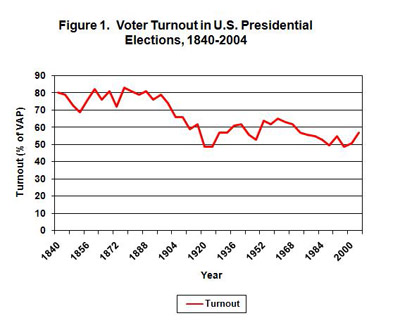 |
|
 |
|
|
|
Dean Sue Rosser Featured in Atlanta Woman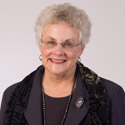 Ivan Allen College Dean, Sue Rosser, is one of 14 women academics featured in an Atlanta Woman online article, “Women Soar In Higher Education.” The article applauds the increasing number of women who hold leadership positions within USG institutions, but reveals that only five of the System’s 36 units have women Presidents. “In this time of budget cuts,” commented Dean Rosser, “it is particularly important that we retain a focus on gender and racial diversity.” |
|
| IAC Enrollment Outpaces Georgia Tech The Ivan Allen College experienced its largest ever enrollment this fall with 963 undergraduate and 283 graduate students matriculating in IAC majors. This is a continuation of the rapid growth the college has experenced during the past six years. From 2002 to 2008, undergraduate and graduate enrollment increased 33%. This surpasses the 18% increase in enrollment for the Institute as a whole. Associate Dean, John Tone explained, “The joint major programs launched within IAC are innovative and these are a significant factor in our rapid expansion. They are attracting the kind of students we want at Georgia Tech.” Two of the most successful joint degrees are the International Affairs and Modern Languages (IAML) program and the Computational Media (CM) program that combines studies in IAC’s Literature, Communications, and Culture and the College of Computing. Dr. Tone added that growth is also occurring in the other joint degrees, Economics and International Affairs (EIA) and Global Economics and Modern Languages (GEML), as well as in the other IAC majors. “We have been very aggressive in implementing programs that add value for students,” explained Tone. “Our international programs and the opportunities for undergraduate research and internships are very strong and this is another draw for students. For example, more than 71% of our undergraduates participate in international programs, compared to 38% for the Institute.” Dean Sue Rosser adds, “We have established Ivan Allen College as a national model for a new approach to liberal arts research and curriculum. Our focus on how society shapes, and is shaped, by science and technology is unique and I think our robust growth reflects that.” |
|
| Media and Voter Registration Rules Will Impact Decision 2008 American voters will soon go to the polls to set the course of the nation for the next four years. Two Ivan Allen College Professors recently offered fascinating insights on factors that will shape our decision on November 4th. Media and American Democracy 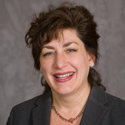 What impact does omnipresent media have on our democratic process? Susan Herbst offered a perspective recently as a speaker for CoC’s Distinguished Lecture Series. Herbst, Executive Vice Chancellor for the University System of Georgia and Professor at the IAC School of Public Policy, explained that the rapid evolution of technology during the last century has rendered the subject difficult to study. “The minute we work with one theory, then the technology changes and another factor emerges.” The Internet is of course the latest change. While it has enabled huge campaign fundraising through small donations, rapid action on the ground, and even voting via internet in a few states, Herbst feels the more interesting effect is on political cognition. “Before the internet, you had a stand-alone story filtered by the media,” Herbst observed. “To learn more, you had to go to a library to follow up and probably didn’t do it. Now, we have instant access to discourse on a subject via the internet and so our political cognition is open to a great deal of information and we determine our own trail, but the evaluation of the experts is lost.” Herbst feels that a significant change is occurring as the internet creates a shift back to discourse driven by citizens who are writing on line. “The media’s 20th century role as gatekeeper has disappeared,” concluded Herbst, “and traditional media, which were pretty much forced to include these citizen perspectives, are able to say that they are not really a media outlet, but more of a public outlet.” Voter Rules Limit Participation Amazingly, the world’s premier democracy consistently boasts one of the world’s lowest voter turnouts. In his talk, “Locked Out? How the United States Limits Voter Participation,” Bill Winders, Assistant Professor of Sociology within the School of History, Technology & Society, presented research suggesting that voting rules are a significant factor in the low turnout among Americans. Winders tracked voter turnout beginning in 1840 when it was relatively high at 80%. From 1896 through 1924, turnout fell dramatically, to about 49%. “This drop provides a clue to why America’s voter participation remains low, even during hotly contested recent races such as those in 2000 and 2004,” said Winders. The dramatic period of decline correlates to changes in election rules, such as literacy test requirements, registration waiting periods, and a shift from a system where the government registered individuals (a non-personal system) to one which required individuals to register themselves to vote. “These rules, some of which were designed to prevent voter fraud, unintentionally created obstacles to voters so that, on polling day, many cannot legally vote. These obstacles continue to have profound effects on voter turnout.” While there are other predictors of turnout, Winders' research suggests their effects are nominal compared to the impact of voting rules. The other industrialized democracies have non-personal registration and, correspondingly, much higher voter turnouts than the U.S. And, in the eight U.S. states that permit election day registration, turnout runs about 14% higher than in other states. Winder identified minorities, women, low education, and low income citizens as those whose voices are represented at a lower rate as a result of the election rules.
Access video of Dr. Winders talk at |
|
| Bogost’s Campaign Rush Ian Bogost, Associate Professor of Literature, Communications and Culture has developed a new game that has just been published by CNN. "Campaign Rush" is a light-hearted game developed by the Persuasive Games studio on the theme of politics and the current election. Play the game at: |
|
| Registration Is Open for Living Game Worlds IV December 1-2, 2008  LCC’s Digital Media Program and the GVU bring together the vanguard of digital gaming at the 4th annual Living Game Worlds symposium to be held December 1-2, 2008. Raph Koster and Chris Klaus headline this year’s conference which will showcase “InterPlay,” networked online play and the rapidly-growing domains of multiplayer games and virtual worlds. The symposium will also feature a Pioneers panel including luminaries Richard Bartle, Brian Green, Chip Morningstar, Randy Farmer and Pavel Curtis. The symposium is expected to draw more than 250 participants, including those attending via Second Life stream. Sessions will explore networked play from an historical, cultural, technological and design perspective, as well as current and future trends such as user-created content and use of virtual worlds in the workplace. Register Early to receive the discounted rate. |
|
Boston Testifies Twice Before Congress School of Economics Professor, Thomas D. Boston, delivered two rounds of testimony in September before separate House and Senate Committees. On September 11, 2008, Boston spoke to the Senate Committee on Small Business and Entrepreneurship chaired by Sen. John Kerry. The hearing focused on “Business Start-up Hurdles in Underserved Communities: Access to Venture Capital and Entrepreneurship Training.” Boston’s remarks focused on the important contribution to the U.S. economy made by businesses that participate in the government’s Small Disadvantaged Business (SDB) program and put forth recommendations for adjusting the program to allow minority firms to “move to the next level of growth.” His testimony concluded, “This committee could facilitate a tremendous leap forward for minority firms in gaining access to capital, bonding and venture capital funding if it would simply make adjustments to one of the federal government's own regulations. By this I mean altering the [sic: $750,000] personal net worth ceiling that is used as criteria for eligibility in the SDB program.” On September 24, Dr. Boston, delivered similar testimony before the House Committee on Oversight and Government Reform’s Subcommittee on Information Policy, Census, and National Archives. That discussion centered on “how information policy affects competitive viability in minority contracting.” Boston made recommendations for replacing the personal net worth ceiling with “more industry specific and business development criteria.” |
|
Taylor Recognized for Best Dissertation Congratulations to Zak Taylor who was honored with the 2008 Virginia M. Walsh Award for Best Dissertation in Science, Technology, and Environmental Politics. The award is given annually by the American Political Science Association (APSA) to a dissertation completed within the prior two years. Taylor is an Assistant Professor in the Nunn School of International Affairs. His dissertation, “The Political Economy of Technological Innovation: A Change in the Debate," examined why some countries are more technologically innovative than others. “There are simply many countries with “good” institutions that do not innovate at the technological frontier,” wrote Taylor, “and many countries with “bad” institutions that have nonetheless built impressive records of technological progress.” Taylor’s research revealed that a country’s international relationships may be the missing piece to the national innovation rate puzzle. He presented evidence suggesting that certain kinds of international relationships (e.g. capital goods imports, foreign direct investment, educational exchanges) do affect national innovation rates in the aggregate. And countries which have these kinds of relationships with the lead innovating nations tend to become more innovative than states which do not, almost regardless of their domestic institutions. |
|
Nunn School EUCE Hailed As “Extraordinary Achievement”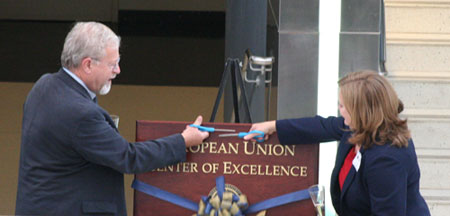
Anthony Smallwood and Dr. Vicki Birchfield at the ribbon-cutting ceremony for EUCE On September 18, 2008, INTA Chair William Long and Associate Professor Dr. Vicki Birchfield, welcomed more than 140 diplomats, academics, and business people to LeCraw Auditorium to inaugurate the new European Center of Excellence (EUCE) Research Center within the Sam Nunn School of International Affairs. Anthony Smallwood, Head of Press and Public Diplomacy for the Delegation of the European Commission to Washington keynoted the event. He lauded INTA leadership for their “extraordinary achievement” in being selected as an EUCE host. “A European Center of Excellence host must be excellent already,” said Smallwood. EUCE Director, Dr. Birchfield, spoke about the “striking parallel” between Georgia Tech’s core mission and the EU goal to increase collaboration with the U.S. "The center will draw upon Georgia Tech’s traditional strengths in science and engineering coupled with the growth of our strong liberal arts curricula to address common problems, especially economic, political and environmental challenges.” Smallwood applauded the Nunn School EUCE for its focus, noting that, despite many common goals, both sides take the relationship for granted. “It is a difficult world,” warned Smallwood, “and no longer a given that the U.S. can guide the global agenda. But we can if we work together.” |
|
New Faculty Profile – Jin Liu Jin Liu joined IAC’s School of Modern Languages this Fall. Prior to Georgia Tech, she taught Chinese language and culture at Cornell University and at intensive summer programs at Middlebury and Princeton in Beijing. She earned her Ph.D. from Cornell University with a dissertation examining recent film, television, Internet, popular music, and fiction rendered in local languages in mainland China. Her interdisciplinary research analyzing contemporary Chinese popular culture through the lens of language reveals “important but overlooked issues.” A primary area of exploration for Dr. Liu is how the Chinese underground and independent films employ local languages to represent the marginal and the unassimilated. A new phenomenon in recent Chinese cinema is the emergence of underground films rendered in sub-national, local languages. “This is a striking deviation from the standard, Mandarin-dominant soundtrack in state-run studio films,” says Liu. “Local language serves as an important marker of marginality in these films. It is a way to express the unassimilated voice, especially for those underclass characters who can’t adapt to rapid societal changes and haven’t been absorbed into mainstream society.” Liu finds that Georgia Tech students are very motivated to learn Chinese language and its context - the economic, cultural, social, and political changes in China. “It’s pretty exciting to be able to apply my research on contemporary Chinese popular culture to teaching,” says Liu. For example, she introduced students to the SHN website www.shanghaining.com and “Shanghai Rap” to enhance their understanding of the contemporary Chinese youth culture. And in a recent fourth-year Chinese class, her students discussed a variety of topics related to the Internet in China, from the recent “iPhone girl” story to the virtual currency “QQ coin” to the Internet censorship. |
|
Jason Landrum - Student Profile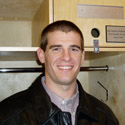 Jason Landrum’s course of study embodies the 21st century vision of the Georgia Tech education: an integration of the scientific and technical with the principles and ethical perspective derived from study of the liberal arts. Landrum earned his undergraduate degree in Earth Sciences from Cornell University. While working on his Ph.D. in Biology at Georgia Tech, he became interested in the environmental issues that were rising to the forefront of public discourse – global warming, energy, pollution, the impact of fisheries, and sustainability. These catalyzed an appreciation for international policy in managing environmental concerns and led him to masters level studies in the Sam Nunn Security Fellowship program and to his current enrollment in INTA's new Ph.D. program in Science, Technology, and International Affairs. The INTA studies have helped Landrum “broaden his lens” to encompass an understanding of how research is implemented in society and how it is used to shape national policies. “My graduate research at Georgia Tech allowed me to redirect my scientific goals and has fostered an appreciation for environmental policy and the sensitive nature and consequences of these policies both domestically and internationally.” |
|
| Remembering Dr. Jon J. Johnston By Bryan Norton 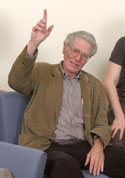 Jon J. Johnston, a long-time professor of Philosophy, Science, and Technology at Georgia Tech, died on October 4, after a long struggle to recover from a serious automobile accident. Beloved by many students and known for his incisive approach to teaching, Johnston inspired students to pursue careers in philosophy and his presence also provided an intellectual haven for students from all fields who felt an awakening within them of a critical ability and a love of wisdom. Jon Johnston was born in Arkansas in 1928, and graduated from Haverford College in the class of 1950. Johnston attended law school, but after a year of classes and an internship he pronounced studying law to be “like eating sawdust” and he dropped out. He was impressed with a lecture by a philosopher from Columbia University and subsequently enrolled there, and also studied at the London School of Economics, University of London. He joined the faculty of the School of Social Sciences in 1967 after teaching at Georgia State for twelve years and has taught many students in his 40 years of teaching at Tech. Johnston emphasized the importance of philosophical and critical thought, organized a philosophy club for students and faculty, and is remembered by many students for his life-changing, challenging style of teaching. An on-campus memorial event is being planned to celebrate the life and career of Professor Johnston later in the semester, probably in early November. Watch for subsequent announcements on this event. The family has requested that, in lieu of flowers, well-wishers make a contribution to the Alpha-one Foundation, which is a support group for those who suffer from alpha-one anti-tripsin deficiency, a disease that harms the lungs. To donate, go to: http://www.alphaone.org/help/?c=Targeted-Donations Click on How to Help and an option for commemorative donations will appear. |
|
